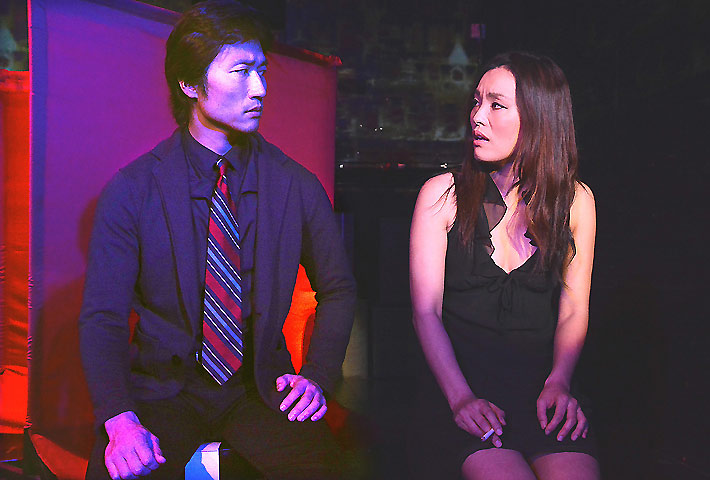Frankly, I wasn’t planning on writing this review.
I saw the show, and well….
Robert Allen Ackerman has New York directing credits popping out of his ears. He’s worked for the New York Shakespeare Festival, with Meryl Streep, Colleen Dewhurst, Helen Mirren and Maurice Evans. He’s directed the Tony nominated, Broadway production of Bent with Richard Gere, received a Outer Critics Circle Award for directing Extremities with Susan Sarandon; he’s won an Obie, he’s won an Yomiuri Award, he’s won the Television Critics Association and Broadcast Journalist Awards, has had Emmys, DGA and Golden Globe nominations, (which he tells us about twice in his program bio) and he’s won the Beatrice Wood Film Award: No, I don’t know what that is, but he won it!
Blood is written and directed by Mr. Ackerman, with original music and songs by Nick Ackerman and Chris Cester.
Blood is not very good….
It fails for the simplest of reasons, the story, the meat of the meat and potatoes” that should make its appearance on stage like in the first five or ten seconds, in Blood doesn’t arrive until the second half of the second act.
The entire first act and a goodly portion of the second are – to use the technical term: “Blah-Blah-Blah!”
The “Blah-Blah-Blah” in question consists of a lack of narrative focus, distracting subplots, stilted dialogue and a startling disregard for the history which he claims Blood is “based” on.
Mr. Ackerman, by burdening this play with a tonnage of the unnecessaries, delays his drama onto death.
This is a pity, because the story behind Blood is one that needs to be told:
In the 1980s, the Japanese government distributed to hemophiliacs across the nation products that had used blood stock they knew to be tainted by the AIDS virus.
This was done partially because certain high ranking bureaucrats in the Ministry of Health and Welfare had convinced themselves that Japanese blood was so pure as to be resistant to the disease. But the main motivation behind the decision to release the tainted blood was to safeguard the profits of the five large Japanese drug firms.
What followed was predictable. Thousands of hemophiliacs who were not warned of the danger, unknowingly, used the blood clotting products and thousands were infected with HIV, hundreds would die.
Including the beloved uncle of a very good friend, who was a Marine colonel that loved Japan and chose there to retire.
His uncle had left him a very valuable and quite beautiful tea service which my friend had to pack away and put in storage.
He just cried too much whenever he looked on it.
Compounding their crime, when people began to fall sick and die, again for the sole benefit of the Japanese pharmaceutical firms, the Ministry refused to allow a safe American coagulant on the market and continued to permit the sales of the tainted product for another two years.
In a society where authority was something to be respected not questioned, and to have HIV was looked upon as something shameful, few came forward to demand answers from the government.
At first.
In 1989 a lawsuit was filed by those infected. It was the first time in their history any Japanese citizen had sued the government.
Still the Ministry denied any responsibility. A cover-up of all guilt followed, records were faked or mysteriously “lost.”
Adding to the difficulty of the case was the initial reluctance of those who had brought the suit to “go public.” In court they testified from behind a black curtain and a number was used in place of their name.
Those responsible for the tragedy felt themselves secure.
But there is a simple truth in life, one that the perpetrator of wrongs and the conspiracy obsessed seems to blind themselves to:
“Foul deeds will rise,
Though all the earth o’erwhelm them to men’s eyes.”
Hamlet
A young man who had contracted the disease from the tainted blood went public.
He stood before cameras, and although even then he wouldn’t reveal his name, he did give a face to AIDS and those who had been sinned against.
It would take two more decades for the story to finally come out and the token punishment of three former pharmaceutical executives to be sentenced to prison to mark the “victory.”
It is an incredible story.
Part mystery, part David and Goliath, all tragedy.
Mr. Ackerman sets the story of Blood in motion, a slow prodding motion, with a Jewish American (Alexa Hamilton) reporter returning to Japan, where she lived as a young woman, after the death of her young son and her divorce. She is reunited with a former student (Taishin Takibayashi) who is determined to reveal his real feelings for her – oh, but he’s suddenly dead, fallen by some strange ailment.
Now our heroine, with the help of a conflicted Korean-Japanese reporter (Sohee Park) sets out to discover the truth behind his death, which may be a mystery to them, but not the audience as the playwright has seen fit to inform them of the Japanese government allowing AIDS tainted blood to be issued to the public.
In fact Mr. Ackerman doesn’t present his work as a thriller, an underdog’s story or a drama of great human suffering, sorrow and courage.
His play is a musical.
But you don’t earn “with Richard Gere, received a Outer Critics Circle Award for directing Extremities with Susan Sarandon; he’s won an Obie, he’s won an Yomiuri Award, he’s won the Television Critics Association and Broadcast Journalist Awards, he’s had Emmys and Golden Globe nominations, he won the Beatrice” for nothing.
The best music in the “original music” are tunes borrowed from other sources that will be recognizable to most theatregoers, though with new, and at times clever, reworked lyrics.
The musical numbers all hint at what Mr. Ackerman does best; Mr. Ackerman puts on superb “Frazzle-Dazzle.”
“Smoke and Mirrors” well-done can conceal a multitude of sins, but when the mirror has nothing to reflect and when all there is to find within the smoke is more smoke – forget it.
Whether it was the weakness of the script or perhaps Mr. Park’s on point impenetrable accent, it’s hard to say, but I wasn’t drawn to listen to the play’s two leads.
That tends to be a problem.
It is a racially mixed cast, a veritable U.N. of talents, so kudos to Mr. Ackerman for being so “all inclusive,” but if an actor can’t be understood you do no service to the play and a great disservice to the actor.
In reading the program after the show, my firm practice, I was not overly surprised by what was there.
The program notes tell the story I’m afraid.
Mr. Ackerman tells us, “Any dramatic work based on truthful events must by definition be fictionalized.”
Really? News to me.
The plays Are You Now or Have You Ever Been, The Chicago Conspiracy Trial, The Bell of Amherst, I could go on – matter of fact, I will – Charlie, Victor, Romeo, Frost/Nixon, The Normal Heart, 1776, Copenhagen, Nixon In China, Give ‘Em Hell, Harry, The Elephant Man, the films The Bunker, Parkland, Dog’s Day Afternoon, Hotel Rwanda, and All the President’s Men which could have served as a good guide for Mr. Ackerman are all historical plays with a minimum of fictionalization, if any.
We are also told by Mr. Ackerman, “Most of the characters living or dead are entirely fictional.”
That’s like when those very odd, sexually perplexing Japanese animation films start with a disclaimer that all the nubile, big eyed cartoon heroines I’m about to see violated by huge tentacles are all over the age of eighteen.
One young actor talks about being the “youngest sales manager, eventually earning $240,000 a month.” But he’s come to Hollywood where, “he’ll become a superstar and change the world.”
Doesn’t give himself much wiggle room there, and the absurdity of the statement was made pathetic by a most unmemorable performance.
One has extensive stage combat training and no theatre training.
Another actor announces he plans to “give an unforgettable performance” which only adds to our disappointment.
I’m sorry, but as a director, though certainly not one with Mr. Ackerman’s trunk full of shiny awards, I wouldn’t have let my actors open themselves to the criticism such statements can bring.
Another is making his professional acting debut.
One “studied cinematography.”
Lots of television credits.
And I see “Theatre Planners” named in the program. Regretfully this usually does not bode well.
It is a youthful cast.
I saw lots of youthful enthusiasm and this is good.
But if there was talent on the stage, I’m afraid I missed it.
There are those on stage who must be admired for going down swinging, but just Michael Joseph who, filling numerous parts in the show, managed to bring definition and vitality to each role he undertook.
No one else on that stage made it to a life boat.
Again kudos to Mr. Ackerman for such openness in his casting, but it really isn’t worth a sack of bent nails if he pushes his actors out on stage and from that point they’re on their own.
The “prime directive” for any director, even one with a trunk full of shiny things, is to make damn sure his actors come off looking the very best they can.
Mr. Ackerman fails in this.
But what confuses me most about this play is not the play.
It’s the critical reaction of my fellow typewriter thumpers, who, as one can read on Bitter Lemons thought this show was the best thing since Brahma gave his tacit consent to masturbation.†
I want to believe this is solely due to differences in taste, but I can’t shake the unpleasant thought that some of these frothing write-ups were the results of being blinded by that trunk load of shiny objects Mr. Ackerman carries with him.
Unfortunately, I’ve seen it before.
TV writers who pen ridiculously inaccurate historical plays, stars in popular sit-com who can’t tell the difference between an “arc” and an “ark,” a director who stages an insufferable one woman show, all given a “Get Out of Jail” card because some dewy eyed “critic” is awed by their accumulation of honors, plaques, and great big blue ribbons.
Honors, plaques, and great big blue ribbons are really nice, and carry the same weight as an elf’s fart.
What do Zona Gale, Hatcher Hughes, Paul Green, Zöe Akins, Jesse Lynch Williams and Susan Glaspell all share in common?
They won Pulitzer Prizes for their plays.
Elf’s farts.
Only one thing matters in a theatre, and that’s the work on the stage.
I don’t doubt Mr. Ackerman’s talents or abilities.
But the work was not on the stage.
I’m sure he would disagree with me.
I’m sure that the critics who wrote such glowing reviews of Blood would disagree with me.
They can.
They’ll just be wrong.
I’ve no doubt they’ll then all dismiss me as being some arrogant failed playwright with a chip on his shoulder.
They’ll be right I suppose about the “arrogant” part.
But they’ll still be wrong about Blood being anything but a good looking failure.
And that isn’t a “chip” on my shoulder, that’s a redwood.
In another part of the program notes, Mr. Ackerman states, “I don’t consider myself a writer.”
And Mr. Ackerman, you shouldn’t.
† The only two exceptions being Will Manus of Total Theatre and Dale Reynolds of Edge Media.
*Featured Photo: Takaaki Hirakawa (Photo by Ed Krieger)
♦ ♦ ♦
Blood has been extended through April 17
• Friday at 8 p.m.: April 1, April 8, April 15
• Saturdays at 8 p.m.: April 2, April 9, April 16
• Sundays at 3 p.m.: April 3, April 10, April 17
at
The Complex (Ruby) Theatre
6476 Santa Monica Blvd
Hollywood, CA 90038
For Tickets and information:
(323) 960-7745 or www.plays411.com/blood








